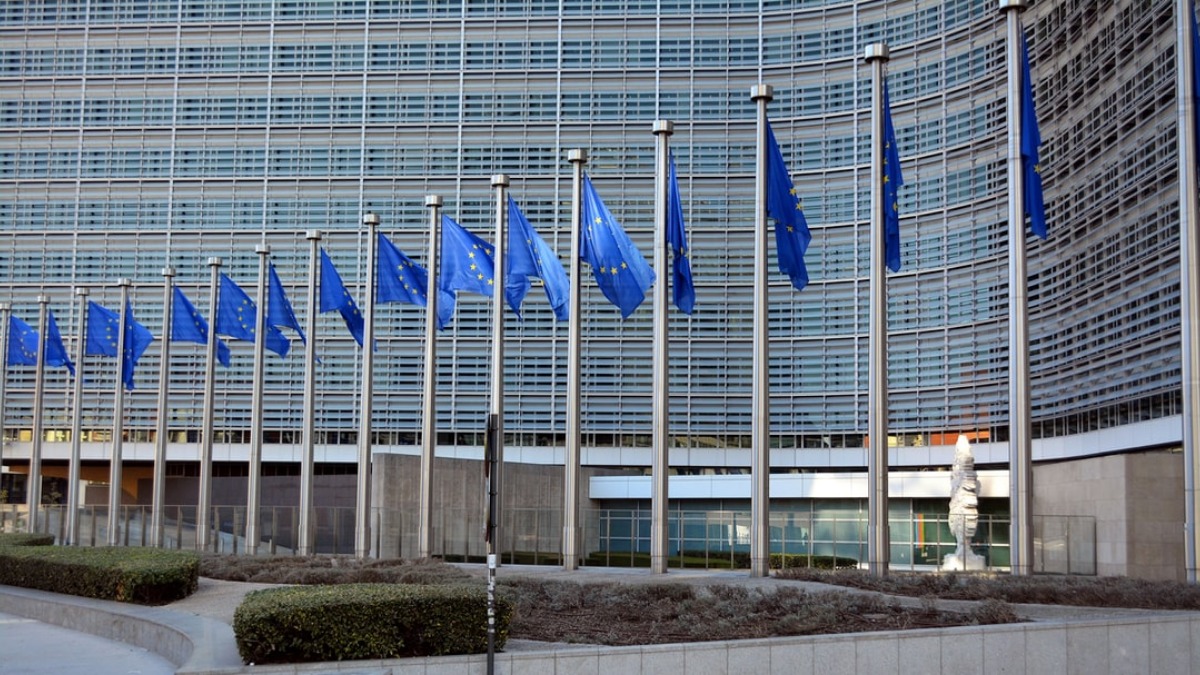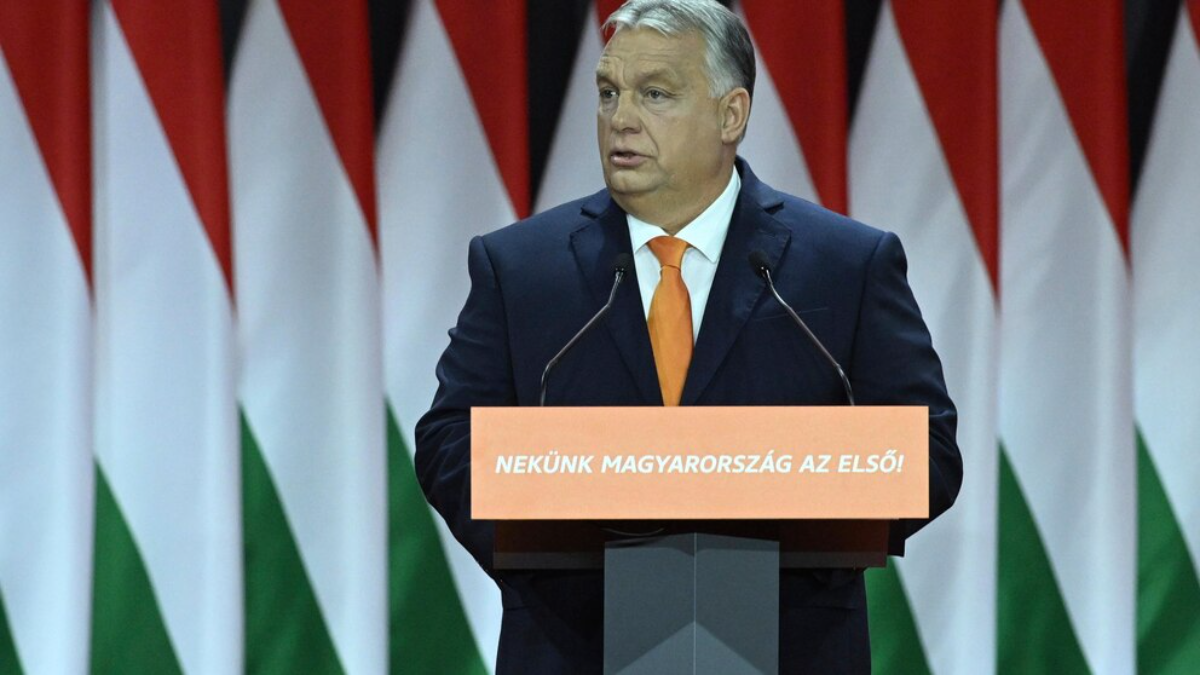European Union
Government and people of Pakistan extend the heartiest congratulations to the European Union

The Government and people of Pakistan extend the heartiest congratulations to the European Union, its member states and European citizens on the occasion of the 71st anniversary of Europe Day. Prime Minister Imran Khan has addressed a letter of felicitation to the President of the European Commission Ursula von der Leyen.
Appreciating the vision of Foreign Minister Robert Schuman and the leaders from Belgium, Italy, Luxembourg, the Netherlands and West Germany, Prime Minister Khan underscored that Schuman Declaration became the harbinger of peace, prosperity and European integration. Europe Day is an occasion to celebrate peace and unity in Europe.
The Prime Minister further emphasized that incorporation of economic interest and creating commercial interdependence among the European countries led to a peaceful, united and prosperous Europe. Peace, prosperity and stability in Europe also contributed to the prosperity in other regions of the world and the Union has, today, become a model of cooperation and solidarity.
Pakistan enjoys excellent relations with the EU and all its member states, which are based on mutual understanding, respect and common values of democracy and pluralism. The Pakistan-EU Strategic Engagement Plan provides the institutional framework for cooperation in diverse fields, including political, economic, security, climate change, green energy, and migration and mobility. Pakistan would continue to work towards further strengthening its multi-dimensional ties with the EU and its member states.
Discover more from The Monitor
Subscribe to get the latest posts sent to your email.
European Union
European Banks Promise €120bn in Shareholder Returns on Interest Rate Gains

European banks have promised to return a total of €120bn to their shareholders this year, marking the highest amount since before the financial crisis. The returns come from gains in interest rates and will be distributed via dividends and share buybacks.

The move is part of a wider strategy by European banks to boost shareholder returns and improve profitability in the face of challenging economic conditions. Banks such as BNP Paribas, Société Générale, and Credit Agricole have all pledged to increase their dividends and buy back shares, while HSBC has promised a $2bn share buyback program.
The increased returns are a sign that European banks are recovering from the financial crisis and are in a better position to reward their shareholders. However, some analysts have expressed concerns that the returns may not be sustainable in the long term and that banks may be neglecting other areas such as investment in technology and innovation.
Table of Contents
European Banks’ Shareholder Return Strategy

European banks have promised to provide €120bn of shareholder returns on interest rate gains. This is the highest amount of returns via buybacks and dividends since before the financial crisis. The banks have been able to increase these returns due to the European Central Bank’s (ECB) decision to end its bond-buying program and raise interest rates.
Impact of Interest Rate Gains
The increase in interest rates has had a significant impact on European banks’ profitability. Banks are now able to make more money on their loans due to the higher interest rates. This has resulted in higher net interest margins for banks, which has translated into higher profits. As a result, banks have been able to distribute higher amounts of money to their shareholders.
Dividend and Buyback Plans
To distribute the returns to shareholders, European banks have announced dividend and buyback plans. These plans involve distributing profits to shareholders in the form of dividends, buying back shares, or a combination of both. The amount of money distributed to shareholders is determined by the bank’s board of directors.
Some of the largest banks in Europe, such as HSBC, Santander, and Deutsche Bank, have announced significant buyback plans. For example, HSBC announced a $2bn buyback plan in 2019, while Santander announced a €1.5bn buyback plan in the same year. Deutsche Bank announced a €1bn buyback plan in 2020.
In conclusion, European banks have been able to provide significant returns to their shareholders due to the increase in interest rates. Banks have been able to increase their net interest margins, resulting in higher profits. This has allowed banks to distribute higher amounts of money to their shareholders through dividend and buyback plans.
Comparison to Pre-Financial Crisis Returns

European banks have promised €120bn of shareholder returns on interest rate gains, with both the last few years and the pre-financial-crisis period seeing high levels of returns. In the years leading up to the 2008 financial crisis, many banks were paying out large sums of money to shareholders, often in the form of dividends. However, the financial crisis led to a sharp decline in bank profits, and many banks were forced to cut back on their dividends and share buybacks.
The current promise of €120bn in shareholder returns is higher than any year since before the financial crisis. This is a sign that European banks are once again in a position to return money to their shareholders. The returns are expected to come from both dividends and share buybacks, with some banks already announcing plans to buy back shares.
It is worth noting that the returns promised by European banks are still below the levels seen in the years leading up to the financial crisis. In 2007, for example, European banks paid out over €200bn in dividends alone. However, the current promise of €120bn is still a significant increase from the levels seen in recent years, and is a sign that European banks are once again becoming profitable.
Overall, the promise of €120bn in shareholder returns is a positive sign for European banks and their investors. While the returns are still below the levels seen in the pre-financial-crisis period, they are a sign that the banks are once again in a position to return money to their shareholders.
Implications for European Banking Sector

Investor Confidence
The promise of €120bn of shareholder returns on interest rate gains is expected to boost investor confidence in the European banking sector. This promise is higher than any year since before the financial crisis, indicating that banks are confident in their ability to generate profits and provide returns to their shareholders. The increased investor confidence is expected to attract more investment in the sector, leading to further growth and expansion.
Market Stability
The promise of high returns via buybacks and dividends is also expected to contribute to market stability. With more cash flowing into the sector, banks will have more capital to invest in their operations, leading to increased stability and growth. Additionally, the high returns promised to shareholders will encourage them to hold onto their shares, reducing volatility in the market.
Overall, the promise of €120bn of shareholder returns on interest rate gains is expected to have a positive impact on the European banking sector. The increased investor confidence and market stability are likely to lead to further growth and expansion, benefiting both the banks and their shareholders.
Frequently Asked Questions

How have European banks’ shareholder returns been affected by recent interest rate changes?
European banks have promised €120bn of shareholder returns on interest rate gains. This is the highest amount since before the financial crisis. The returns are expected to be delivered via buybacks and dividends.
What methods are European banks using to deliver returns to shareholders?
European banks are using buybacks and dividends to deliver returns to shareholders. Buybacks involve a company purchasing its own shares from the market, thereby reducing the number of outstanding shares. This increases the value of the remaining shares. Dividends are payments made by a company to its shareholders. These payments are usually made from the company’s profits.
What is the historical comparison of the current shareholder returns to those before the financial crisis?
The current level of shareholder returns promised by European banks is higher than any year since before the financial crisis. The €120bn promised is a significant increase from the €100bn promised in 2018.
What are the implications of the ECB’s negative interest rate policy for bank profitability?
The European Central Bank’s negative interest rate policy has put pressure on bank profitability. This is because banks have to pay to keep their excess reserves with the ECB. This has led to some banks passing on the cost to their customers by charging negative interest rates on deposits.
How does return on equity for European banks currently compare to previous years?
The return on equity for European banks has been improving in recent years. In 2019, the average return on equity for European banks was 7.3%, up from 6.4% in 2018. However, this is still lower than the pre-financial crisis levels of around 15%.
What factors are contributing to the increase in shareholder returns among European banks?
The increase in shareholder returns among European banks can be attributed to several factors. One of the main factors is the low interest rate environment, which has led to increased demand for higher-yielding assets. Another factor is the improved financial performance of European banks, which has led to increased profits and cash reserves. Finally, the regulatory environment has become more favorable, with regulators allowing banks to return more capital to shareholders.
Discover more from The Monitor
Subscribe to get the latest posts sent to your email.
European Union
The West’s Credibility Crisis: How Western Support for Israel Threatens the Liberal World Order

The conflict between Israel and Gaza has been ongoing for years, with the latest round of violence causing widespread destruction and loss of life. The West’s response to the conflict has been a source of controversy, with many questioning the impact of Western support for Israel on the liberal world order.
The West’s credibility crisis is a growing concern, with a widening chasm between Western values and conduct. This has triggered a credibility crisis that threatens to unravel the liberal world order. The biggest threat to the liberal world order comes from liberal democracies and not their autocratic nemeses. The rise of authoritarian tendencies across the world is a major concern.
The impact of the West’s credibility crisis on the Middle East is significant. The region has been a battleground for competing ideologies, with Western powers often intervening to promote their interests. The West’s credibility crisis has undermined its ability to shape events in the region, leaving a vacuum that autocratic regimes have filled.

The biggest threat to the liberal world order comes from the rise of autocracies. The trend towards authoritarianism is a global phenomenon, with countries such as Russia, China, and Turkey leading the way. The impact of autocracies on the Middle East has been significant, with many countries in the region falling under the sway of authoritarian leaders.
The great liberal promise of the West has left behind a debris of chaos, bloodshed, and broken promises. The Western narrative and its legitimacy have been questioned by those who have suffered immensely due to it. The impact of Western policies on the Middle East has been significant, with many countries in the region experiencing instability and conflict as a result.
The war in Gaza is a prime example of the mismatch between rhetoric and actions. The consequences of Western support for Israel are damaging the legitimacy of the rules-based order. The impact of the war on the Middle East has been significant, with many countries in the region experiencing increased instability and conflict.
To sum up, Western governments must uphold their values and ensure that their actions match their rhetoric. The impact of Western support for Israel on the liberal world order cannot be ignored. It is time for the West to take a hard look at its policies and actions and make the necessary changes to ensure that the liberal world order is preserved. The impact of the war on the Middle East must also be taken into account, with efforts made to promote stability and peace in the region
Discover more from The Monitor
Subscribe to get the latest posts sent to your email.
European Union
A Pyrrhic Victory for Ukraine: Hungary’s Veto Casts a Shadow Over EU Membership Dream

In a night of stark contrasts, the European Union offered Ukraine a glimmer of hope by opening the door to membership, only to have Hungary slam it shut on crucial financial aid. While President Zelensky hailed the accession talks as a “victory,” the bitter sting of Hungary’s veto on a €50 billion aid package left a bitter aftertaste. This geopolitical chess game, unfolding amidst the backdrop of a brutal war, raises critical questions about solidarity, unity, and the true meaning of European values.
Hungary’s decision, orchestrated by Prime Minister Viktor Orbán, stands as a stark reminder that the path to EU membership is fraught with political hurdles. Orbán, a long-time critic of Ukraine’s President Zelensky and a close ally of Russian President Putin cited concerns about Ukraine’s readiness and the potential burden on Hungary as reasons for his veto. However, many see this move as politically motivated, a calculated leveraging of EU funds frozen over rule-of-law concerns.
This cynical ploy throws a wrench into the narrative of unwavering European support for Ukraine. The war-torn nation, battling for its very existence against Russian aggression, desperately needs this financial lifeline. The €50 billion package, earmarked for reconstruction, humanitarian aid, and military assistance, is not a luxury, but a lifeline. Every euro withheld is a victory for Putin, prolonging the suffering of the Ukrainian people.
Hungary’s isolation in this decision is palpable. All 26 other member states backed the aid package, highlighting the widening chasm between Orbán’s nationalist populism and the EU’s values of unity and solidarity. The European Council President, Charles Michel, called Orbán’s veto “unjustifiable,” and the chorus of condemnation from other member states is growing.
Beyond the immediate financial impact, Hungary’s veto casts a shadow over the future of EU enlargement. The prospect of Ukraine’s accession, once seen as a symbol of European unity against Russian aggression, is now tainted by political manoeuvring and self-interest. This raises concerns about the EU’s credibility as a beacon of hope and a guarantor of security for aspiring members.
However, amidst the disappointment, there are glimmers of hope. The opening of accession talks for Ukraine is a significant step forward, a tangible recognition of the country’s democratic aspirations and its unwavering commitment to European values. It is a clear message to Putin that Ukraine has a future within the European fold, a future that cannot be extinguished by bombs or vetoes.
Moving forward, the EU must find a way to overcome this internal friction. Hungary’s veto cannot be allowed to derail the Ukrainian people’s legitimate pursuit of membership. Potential solutions could include amending the voting procedure for future aid packages, exploring alternative funding mechanisms, or even imposing sanctions on Hungary for obstructionism.
Ultimately, the responsibility lies with Orbán. He must choose whether to stand on the side of history, supporting Ukraine in its fight for freedom and democracy, or remain tethered to his own narrow political agenda. The eyes of Europe, and indeed the world, are watching.
The story of Hungary’s veto is not just about euros and political gamesmanship. It is a story about the values that define Europe – solidarity, unity, and the courage to stand up for what is right in the face of adversity. While the sting of the veto is immediate, the long-term consequences depend on how the EU and its member states respond. Will they allow Orbán’s cynicism to dim the light of European hope for Ukraine? Or will they rise to the challenge, reaffirming the values that bind them together and forging a path towards a future where all of Europe stands united against tyranny and oppression?
This is not just a question for politicians and diplomats; it is a question for every European citizen. We must demand that our leaders stand on the right side of history, that they reject the cynicism and self-interest that fueled Hungary’s veto, and that they work tirelessly to ensure that Ukraine’s dream of European membership does not become another casualty of this tragic war.
The fight for Ukraine’s future is far from over. The opening of accession talks is a victory, but the battle for financial aid, for unity, and the very soul of Europe continues. We must stand with Ukraine, not just in words, but in deeds, ensuring that the light of hope kindled by the EU’s embrace does not flicker out, but burns brightly, guiding Ukraine towards a future it so rightfully deserves.
Discover more from The Monitor
Subscribe to get the latest posts sent to your email.
-

 Featured5 years ago
Featured5 years agoThe Right-Wing Politics in United States & The Capitol Hill Mayhem
-

 News4 years ago
News4 years agoPrioritizing health & education most effective way to improve socio-economic status: President
-

 China5 years ago
China5 years agoCoronavirus Pandemic and Global Response
-

 Canada5 years ago
Canada5 years agoSocio-Economic Implications of Canadian Border Closure With U.S
-

 Democracy5 years ago
Democracy5 years agoMissing You! SPSC
-

 Conflict5 years ago
Conflict5 years agoKashmir Lockdown, UNGA & Thereafter
-

 Democracy5 years ago
Democracy5 years agoPresident Dr Arif Alvi Confers Civil Awards on Independence Day
-

 Digital5 years ago
Digital5 years agoPakistan Moves Closer to Train One Million Youth with Digital Skills


















